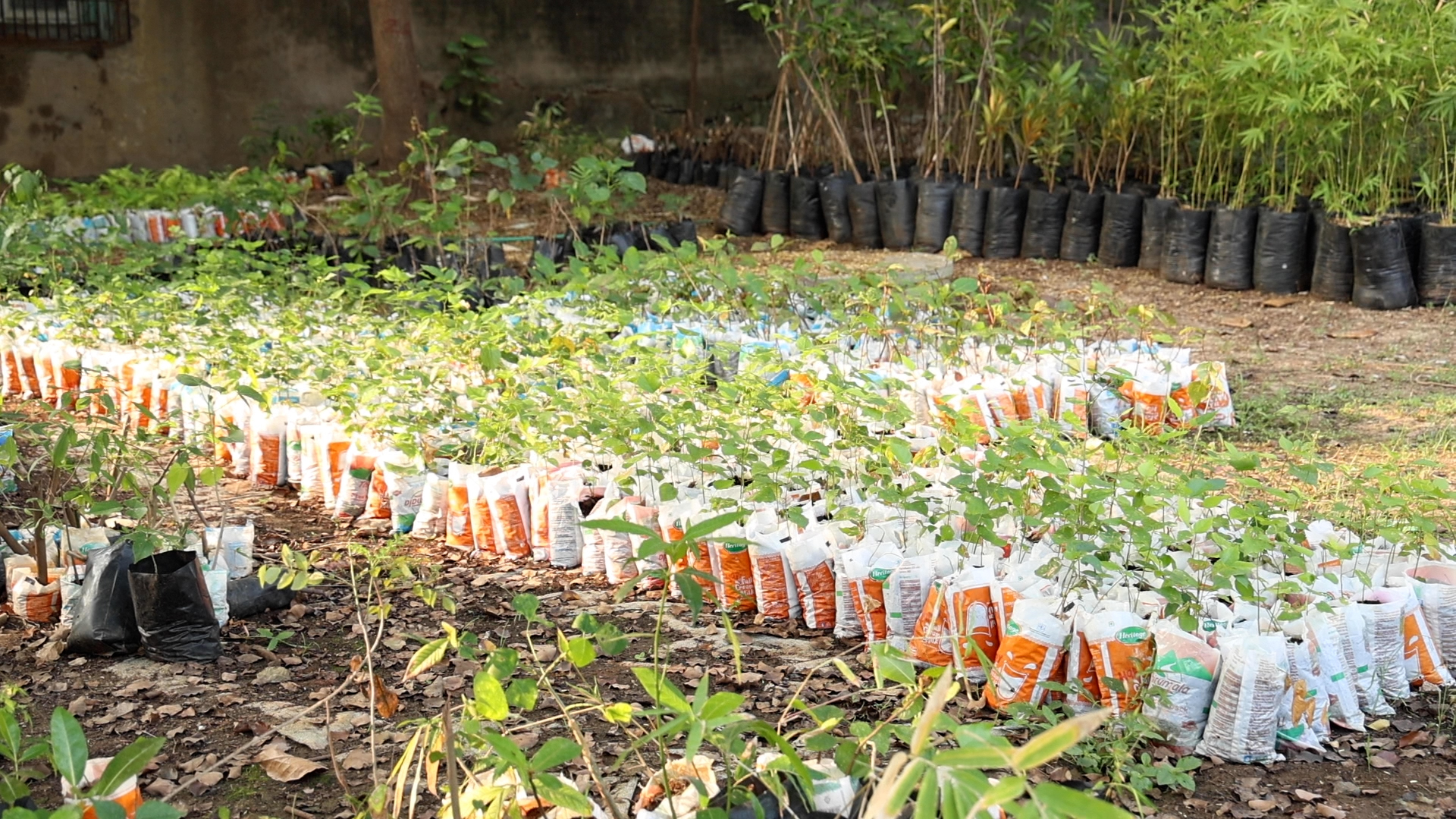How a Chennai school campus was transformed into a mini-forest
Vijayakumar, Headmaster of a government school, along with the residents of Mogappair and ExNoRa, has transformed the campus with his eco-conscious initiative, giving the premises a new identity and a vision for the future that shapes young minds

A few members from the team and Vijayakumar with the students of the school (Manivasagan N)
CHENNAI: In September 2020, as the world endeavoured to recover from the first wave of the COVID-19 pandemic, Headmaster Vijayakumar of Government Boys High School, Mogappair East, had a visionary plan to utilise the lockdown period. Individual efforts, supported by the community, always yield fruitful results.
From concrete to canopy
“With schools closed and everything shifting online, we were encouraged to visit the campus regularly. I decided to seize this time to work towards making the world a better place. Miyawaki forests play a vital role in combating climate change,” says Vijayakumar. To realise his vision, he transformed a section of the campus into a green space. “The area where we now have the Miyawaki forest was previously used by residents to dump rubbish,” he explains.
The Miyawaki method, developed by Japanese botanist Akira Miyawaki, promotes the dense plantation of native trees in urban areas, making it an effective method for pollution control. With Team Green, a group of residents from Mogappair, he implemented his vision.
“Pollution levels are high in urban areas, making this method crucial in combating environmental degradation. The Miyawaki technique is ideal for places with limited space for tree planting. However, it is equally important to continue planting trees in rural areas to maintain ecological balance,” says Deepa from Team Green.

Children engaged in the plantation of Miyawaki forest
A boost for native plants
A total of 1,000 native saplings were planted across a 5,000 sq. ft. area. Finding a diverse variety of saplings was a challenge, leading the team to travel to ECR, Madhavaram, Vellore, and Padappai. The Avadi Corporation supported the initiative by providing organic fertilisers, and in 2021, the 1,000th sapling was planted by Minister of Education Anbil Mahesh.
“The first six months of maintaining a Miyawaki forest are the most crucial and labour-intensive. We implemented drip irrigation and regularly de-weed to help the plants grow. After a year, maintenance became easier. Just as humans learn to care for themselves, these native trees and plants began thriving independently,” explains Vijayakumar.
The primary function of a Miyawaki forest is to purify the air and reduce carbon emissions. Additional support from Indian Oil Corporation and ExNoRa helped sus-
tain the miniature forest. Students are actively involved in learning about the native plants, their growth, and their benefits.

Initial sowing of Miyawai forest in 2020
Collective efforts toward sustainability
While this is not the first Miyawaki forest in Chennai, its impact on the community and students has been remarkable. “The pandemic made us realise how crucial oxygen is. Through initiatives like this, we can produce oxygen and breathe fresh air at no cost. What makes this project even more special is that residents voluntarily help maintain the forest,” says Indrajithu from ExNoRa.
The team has also introduced a unique recycling initiative to reduce plastic waste. “We collect used milk covers from organisations and residents to store plant saplings. This has significantly reduced plastic pollution. The saplings are then distributed to schools and other organisations, not for profit, but as a community effort,” says Lion George from Team Green.
So far, the team has repurposed over one lakh milk covers, conserving 81,000 plants. In just three years, they have distributed over three lakh plants. Every morning at 7 am, they set out on a planting spree, finishing by 9 am, before continuing with their daily routines. On weekends, their children too join them, taking their baby steps to learn about gardening and sustainability.
Beyond tree planting, the team also focuses on social responsibility. In front of the school, they have established Anbu Suvar (Wall of Kindness), where people can donate food, clothes, and stationery for those in need.

Anbu Suvar
Miyawaki School: A greener identity
The Miyawaki forest has not only benefited the surrounding but also reshaped the identity of the school. “People now recognise us as the Miyawaki School. Our students actively participate in maintaining the garden, which helps them connect with nature. Being surrounded by greenery also improves their mental well-being. We are shaping responsible individuals who care for the world around them,” says Vijayakumar. This transformation has led to an increase in student enrolment, growing from 90 to 350.

Milk covers resused to store plant saplings
For a better, healthier future
Team Green comprises individuals from various fields, including law, medicine, education, social service, and engineering. “Schools and colleges are the future pillars of society. Educating students about sustainability ensures that they will carry this initiative forward,” says Tamil Mani from ExNoRa. The Miyawaki School has now become an educational space, with many schools and colleges visiting for field studies. “Deforestation and water scarcity are major concerns today, leading many from rural areas to migrate to cities. By making responsible choices—like planting trees and segregating waste — we can reverse these issues. Through small but conscious steps, we can build a greener, more sustainable future,” he concludes.

Miyawaki at Mogappair in 2025



